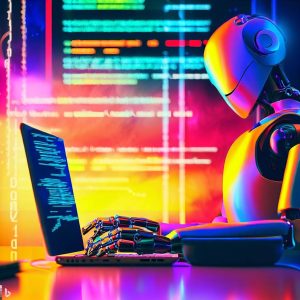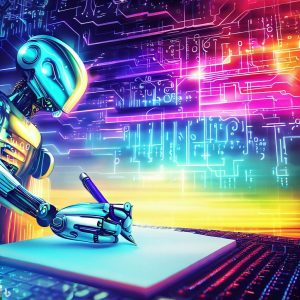In today’s ever-changing, technology-driven world, Artificial Intelligence (AI) is rapidly becoming a crucial part of our daily lives. It is gradually transforming the way we work, shop, and interact with one another. This groundbreaking technological innovation has significantly impacted the global job market, with far-reaching consequences on workforce dynamics, industries, and the labor economy. This article delves into the pros and cons of AI on the job market, and explores various aspects of this phenomenon in detail, including productivity, job creation, safety, customer experiences, job displacement, inequality, and the need for re-skilling.
The Pros of AI on the Job Market
Increased Productivity and Efficiency
The advent of AI has brought about a surge in productivity and efficiency across numerous industries. From automating monotonous tasks to optimizing complex procedures, AI-driven systems can process vast amounts of data quickly, freeing up human workers to focus on more strategic and creative tasks.
Creation of New Job Roles in the AI Field
Although AI has automated some jobs, it has also given rise to new opportunities and roles within the technology and AI sector. These include AI developers, data scientists, machine learning engineers, and broadly, the entire AI ecosystem.
Improved Safety and Reduced Risk in Hazardous Industries
AI deployment in high-risk sectors such as mining, construction, and chemical manufacturing has significantly minimized human involvement in hazardous operations, consequently reducing workplace injuries and fatalities.
Enhanced Customer Experience and Personalized Services
Driven by the power of AI, personalized and tailored services have become the new normal in industries such as retail, hospitality, and finance. AI-enabled chatbots, targeted marketing strategies, and efficient shopping assistants have improved customer experiences, leading to higher satisfaction rates and increased brand loyalty.
If you are new to Artificial Intelligence read our article: What is Artificial Intelligence (AI)?
The Cons of AI on the Job Market
Job Displacement and Automation of Routine Tasks
While AI-driven automation has led to productivity gains, it has also displaced numerous jobs in the process. Routine tasks, particularly in industries like manufacturing and customer service, have witnessed considerable job displacement as a result of automation.
Inequality and Socio-Economic Impacts
The AI revolution also risks widening socio-economic gaps, with highly skilled labor experiencing increased demand and reaping the benefits, while those lacking relevant skills struggle to stay afloat in the job market. This digital divide may result in increased inequality and polarization, with the long-term consequences still uncertain.
Need for Upskilling and Reskilling to Adapt
As industries evolve and demands shift, employees must adapt to remain relevant in this era of AI. Upskilling and reskilling have become increasingly important, necessitating a proactive approach to learning new technologies and developing the aptitude to navigate the dynamic labor market.
The Future of AI in the Job Market
As AI technology evolves, experts predict that there will be an increase in the need for collaboration between humans and AI. We will likely see humans working alongside AI systems to enhance overall productivity, decision-making, and innovation. In the AI era, certain job roles may be rendered obsolete, but many believe that new job categories will emerge, requiring workers to adapt and acquire new skills.
It is essential to consider the importance of education and training in this new landscape. To remain competitive, workers must invest time in continuous learning, embrace new technologies, and become more adaptable. Governments, educational institutions, and corporations all play crucial roles in providing resources and opportunities for upskilling in the face of AI-driven changes.
Related Reading: The Best Artificial Intelligence Tools to Start a Business in 2023
Case Studies and Examples
To better understand the impact of AI on the job market, let’s look at some real-life examples across different industries and job roles:
- Healthcare: AI-powered tools are becoming indispensable for diagnostics, treatment planning, and patient monitoring. While some fear that AI may replace medical professionals, it’s more likely that practitioners will embrace AI to improve patient care and achieve better outcomes at reduced costs.
- Manufacturing: Robotics and AI-driven automation are revolutionizing the manufacturing industry, leading to increased efficiency and productivity. As AI systems undertake repetitive and hazardous tasks, the demand for skilled technicians and engineers who can manage and maintain these systems continues to rise.
- Customer Service: AI chatbots are becoming a popular solution for handling routine customer inquiries, but they cannot replace the human touch in situations that require empathy and complex problem-solving. Customer service representatives who are adept at working alongside automated technologies and possess excellent interpersonal skills will remain in high demand.
The impact of AI on the job market is multifaceted, complex, and transformational. As we’ve examined, AI has the potential for remarkable collaboration with human workers, ultimately leading to greater productivity and growth across industries. The future job market may look different, with certain roles becoming obsolete and new ones being created. Workers need to adapt to survive and thrive, taking advantage of lifelong learning opportunities and developing a mindset of resilience and flexibility.
While there is much speculation about AI’s impact on the job market, it’s clear that we cannot ignore the disruptions it brings. Embracing technological advancements with open minds and a proactive attitude will ensure a more prosperous and rewarding future for all. For more information on Digital Warrior, visit our About page.









